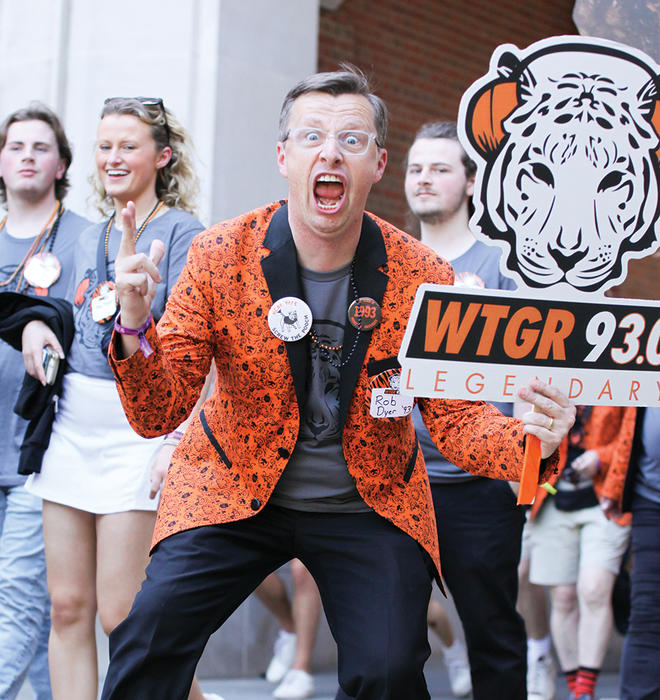
Although William Richardson ’73 was celebrating his 50th, Reunions 2023 was his first time marching in the P-rade. That moment of being cheered on by the younger classes and celebrating among a network of so many alumni was emotional, Richardson said. “I realized just how lucky I was to be around such smart people who taught me so much,” he added.
During the weekend he also reconnected with his freshman roommate, Evan Nickles ’73, for the first time since their graduation, attended a handful of panels, and revisited many of his favorite spots on campus. “I just had a fantastic time,” he said.
That same joy and excitement was shared across the roughly 25,000 alumni, family, guests, faculty, staff, and graduates who gathered at Princeton May 25-28. If Reunions 2022 was a warmup as COVID restrictions were just loosening and the extreme heat impacted the mood, this year the festivities and energy were back in full force.
The picture-perfect weather was a welcome backdrop to the parties, music, and panels covering a range of topics from climate change to construction. This year also held special significance as it marked the 50th anniversary of the first four-year undergraduate class of women.
PAW was there to capture the best moments and the ones you may have missed:
Our P-rade Favorites
From alums dressed as tigers to a variety of clever costumes showcasing Princeton’s colors and spirit, there was orange and black everywhere. Standout themes included Blink-2013, the class that dressed in punk-rock-themed attire; the ultra-sparkly tiger jackets worn by the Class of 2018; and the Class of 1963’s “It’s Twistin’ Time” theme complete with prescription pill bottle-shaped signs.
Women, Fight for Equality Take Center Stage
As Princeton celebrated 50 years since the first four-year class of women graduated, two alumnae drew an overflow crowd for a Friday discussion about motherhood and careers, titled “Women Wanting More.” Attendees lined the aisles, with some sitting right at the panelists’ feet.
Former SPIA dean Anne-Marie Slaughter ’80 questioned Majka Burhardt ’98, a professional rock and ice climber who recently published a memoir, titled More, about the experience of having twins. Slaughter has become a prominent voice in the discussion around women and work, having drawn criticism and praise for her 2012 Atlantic article “Why Women Still Can’t Have It All.”
The conversation veered into how couples divide domestic responsibilities, how old expectations for women’s roles at home linger, and how hard it can be for women to go back to work after maternity leave. Slaughter said she learned from Hilary Clinton while working at the State Department to replace her “either/or” lens on these issues with “both/and.”
“We’re so accustomed to setting this up as men vs. women or work vs. family,” Slaughter said. “Whereas, as far as I’m concerned, people who work for me, who are able to care for their families when they need to, are better workers. They’re more fulfilled in their work, they’re more fulfilled in their family.”
Burhardt said that on the day she had her twins, she also bought a house and the nonprofit organization she started got a huge grant. “For me there was never the question of what do I stop doing, it was how do I do all of this? And how do I do all of this and not go crazy?” she said.
“That’s also about being the kind of mom I want to be. Because I didn’t want to give anything up. I wanted to find a way where I could do it. And that meant this whole other journey around balance — which I don’t really believe in — around how you keep making your life more complex but you’re also humble and gentle to yourself and the people around you.” By E.H.D.
Class of 2023 Jacket Earns Rave Reviews for Designer
Michael Tran ’23 began drafting ideas for his Senior Jacket during his junior year. The B.S.E. major from Bridge City, Texas, has had a passion for art for as long as he can remember, and designed a handful of T-shirts and logos for different Princeton groups and programs throughout his time on campus.
The Class of 2023 jacket is black and features orange linework that depicts a tiger using an Asian-art style down the right sleeve and ivy creeping around the left shoulder. A nod to the prominent stripes featured on past jackets, it includes asymmetrical orange and white stripes on the back that trail diagonally from the top right shoulder. The University shield sits on the left sleeve. On the back is a big orange circle with the class year that includes an outline of Nassau Hall, and the word “Princeton” at the bottom.
Tran said he looked at past jackets for inspiration. “I was just picking stuff up that I liked,” he said. He asked many classmates what they hoped to see on the jacket and consulted friends as he updated the design. For example, one friend suggested the jacket needed to be a little tacky to really embrace the spirit behind the attire, and that’s when the large orange circle was added to the back. “Everything was hand-drawn on an iPad,” Tran added.
He put the project down for months and began to doubt whether it was worth submitting the design to the class jacket contest. At the last minute he decided “Why not?”
The class donned the new jackets throughout Reunions weekend, and Tran said many alumni complimented his work. “It’s pretty surreal, and it’s really validating,” he said.
The success even inspired a change of heart for his post-graduation plans. “I majored in computer science for financial security reasons. I do like it to some extent and I think I’m pretty decent at it, but I don’t love it and I’m not passionate about it. Art is something I’ve enjoyed doing my whole life, but I’ve never let myself get formal experience in it.”
Winning the contest has “helped me make the decision to try to at least lean into something creative-related, career wise,” he added. By C.S.
Back to Work ... On and Off the Court
The men’s basketball team’s annual Friday morning Reunions “chalk talk” opened with a Q&A featuring two of the team’s March Madness stars, guard Blake Peters ’25 and forward Zach Martini ’24.
They recalled their greatest challenge in Ivy League play (beating Yale) and the exponential growth of their postseason crowds. The players could not stay long, though, because they were due back at the Class of 1963’s tent. Yes, the Tigers won two NCAA Tournament games this year. No, that doesn’t mean they can be late for a shift on their Reunions crew.
While the players returned to work the registration table and set up for the day’s events, about 60 alumni gathered in McDonnell Hall, where head coach Mitch Henderson ’98 talked about his team’s breakthrough season and shared thoughts about the five incoming freshmen. He finished his talk by highlighting the significance of the team’s core values: “focus, joy, humility, and light-heartedness.” By Sophie Steidle ’25
Change Princeton, Change the World
Since 2020, the Concerned Black Alumni of Princeton (CBAP) have advocated for the University to add an applied research center devoted to combatting and eradicating racism. At the independent group’s Reunions panel this year, organizers invited collaboration from alumni affinity groups, including the Association of Black Princeton Alumni, the Asian American Alumni Association of Princeton, the Association of Latino Princeton Alumni, and Native Alumni of Princeton.
Panelists — both in person and joining via Zoom — were enthusiastic about the chance to support new scholarship that could, in the words of Manuel del Valle ’71, “change the discourse” on matters of race and ethnicity and promote liberty and equality. They discussed potential areas of study, from medical racism to mass incarceration, as well as the practical matter of funding a new center. CBAP has set an ambitious $1 million fundraising target but only has commitments for a small fraction of that goal.
Ideas for making Princeton more diverse and inclusive were also on the agenda at a Saturday morning Alumni-Faculty Forum titled “Breaking Down Barriers: Intergenerational Perspectives on Social Issues.” Each generation puts its own stamp on the University, sometimes without realizing it, said David Addams ’78, citing his class’s sit-in at Nassau Hall and the campaign to have Princeton divest from South Africa during apartheid.
John Hammond III ’98, attending Reunions for the first time since he graduated, spoke about his frustration at not being able to major in African American studies. At the time, events for Black and brown students were on the periphery of campus social life. In both areas, he said, Princeton has seen improvement. “We’ve got to applaud that,” Hammond said, “and keep pushing.” By B.T.
An Optimistic Outlook for Viewpoint Diversity
A standing-room-only crowd filled McCosh 46 for a panel discussion, sponsored by the James Madison Program in American Ideals and Institutions, provocatively titled, “When Professions Go Woke, Can Dissenters Survive?”
Professor Robert P. George, who moderated the panel, framed the discussion by defining “wokeness” as “the attitude of a person who regards his or her opinions as so obviously correct and so profoundly enlightened that those opinions may not legitimately be challenged or questioned, and that only hate or bigotry can explain other people holding different beliefs.”
Panelists recited many incidents of conservatives facing criticism for expressing their views but struck a more optimistic note when discussing their own fields. Joel Alicea ’10, an assistant professor of law at the Catholic University of America, discussed recent controversies such as a disruptive protest of federal judge Kyle Duncan at Stanford University law school, but posited that factors within the legal profession might temper ideological extremism.
Ramesh Ponnuru ’95, editor of the National Review and a columnist for The Washington Post, said that, for writers such as himself, “some of those old norms of fair debate and viewpoint diversity are, if not exactly thriving, they’re surviving.” He advised conservative writers to stand up to criticism, take on the other side’s best arguments, and tell readers things they might not want to hear.
This perspective was seconded by Ryan Anderson ’04, president of the Ethics and Public Policy Center, who said, “I think there is a hunger out there with the American people for truth-tellers who can do it with civility.”
The three alumni were joined on the panel by Dr. Kristin Collier, an associate professor of medicine at the University of Michigan.
Although the panelists acknowledged that some questions, such as whether slavery should be permitted, are beyond argument, they suggested best practices for discussing other sensitive topics.
“The key thing is to ask the question, ‘Can this opinion be held by an intelligent person of good will?’ and then exercise charity and humility when you’re providing an answer to that question,” Ponnuru said. “I think that can help resolve a great many of these disputes.”
Added Alicea, “[T]he answer to the question cannot be that I draw the line according to the degree of harm that I perceive to result from your point of view … . Then that’s not really a principle at all that allows for debate.” By M.F.B.
Eisgruber Addresses Wide Range of Questions
During his hour-long presentation with alumni in Richardson Auditorium, President Christopher Eisgruber ’83 delivered an update on what has been happening on campus, from the large number of construction projects to 16 titles won by Princeton athletic teams. He took questions at the end of the talk, and here are the key moments:
Gender identity and athletics: “I think it is really important to ... support students of all gender identities, and to recognize how profound that issue is,” Eisgruber began, pointing out that the current generation of students thinks differently about gender identity than previous generations did, “and that means you’re going to have to ... recognize that those identities are going to challenge some of the norms we’ve had in the past.” Noting that gender distinctions are often drawn in athletics, Eisgruber then added, “I think there we have to be guided by decisions that are made at the level of athletic organizations.” As an example, he cited the Ivy League’s decision to allow Penn swimmer Lia Thomas to compete as a woman, a decision he supported. Sometimes, Eisgruber continued, such decisions are “going to produce perceptions of unfairness, but there are lots of unfairnesses that come from the intersection of biological and social categories.”
Princeton as an international university: Eisgruber noted that nearly a fifth of the undergraduate student body and nearly 40% of the graduate student body is foreign born. “We depend on this extraordinary talent,” he said, “and we seek the best talent that we can find from all over the world.” The president highlighted several international initiatives, such as the Paul and Marcia Wythes Center on Contemporary China and the M.S. Chadha Center for Global India, but added that heightened international tensions have made it difficult to send students overseas, particularly to China. “We’re dealing with a world where some of these things have become much more complicated.”
Future campus plans: Eisgruber said that upgrading existing dormitories will be a priority once current construction projects are finished. Some older buildings will require renovation, but new types of undergraduate housing will also be needed to accommodate students, such as military veterans, who may already have families. “We’re not equipped for undergraduates who arrive with two kids and a spouse,” Eisgruber noted. By M.F.B.
Honoring ’58’s Support of Prison Tutors
The Petey Greene Program, a Princeton-based nonprofit that sends volunteer tutors from colleges to prisons around the country, celebrated its 15th anniversary at Reunions and honored the contributions of members of the Class of 1958, including founder Charlie Puttkammer and his wife, Cordie, and former executive director Jim Farrin.
More than 3,500 Petey Greene volunteers have worked with incarcerated students, and according to CEO Jeffrey Abramowitz, the program enables college students “to see the humanity of the people behind the walls.” The Rev. Erich Kussman, a Lutheran pastor in Trenton, New Jersey, was one of the first students tutored by Petey Greene volunteers, and years after his release from prison, when he graduated from the Princeton Theological Seminary, Farrin was there to congratulate him. “Without your guidance and without your selfless love,” Kussman told Farrin at the Reunions event, “I wouldn’t be able to do the work I do in the city of Trenton, which serves hundreds of folks daily.” By B.T.
Art Museum Project Comes Into Focus for Alumni
Alumni returning for Reunions found that construction on the new Princeton University Art Museum is well on its way. The steel frames that were just being erected last summer are now furnished with timber and — in the case of one of the seven pavilions closest to McCosh — clad in a white marble-tipped concrete facade. The University anticipates that the museum will be open before Reunions 2025.
The sprawling construction site in the heart of campus has been cause for much conversation: How will the new museum impact campus life? Why does the building look “brutalist”? These were among the queries addressed on Friday afternoon when James Steward, director of the museum, and Ron McCoy *80, the University architect, sat down with alumni in Robertson Hall’s Arthur Lewis Auditorium.
The discussion covered why an entirely new building is being constructed instead of renovating the former structure, style choices, and the museum’s massive size. On that last point, McCoy made the case that big does not mean imposing. “The building embraces the landscape around itself and brings that landscape into the room,” he said. By Hannah Su ’24


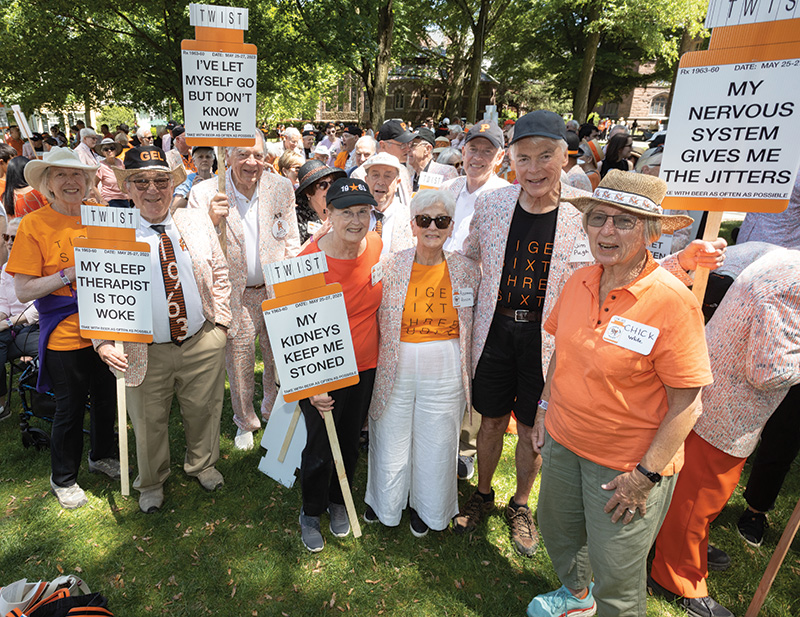
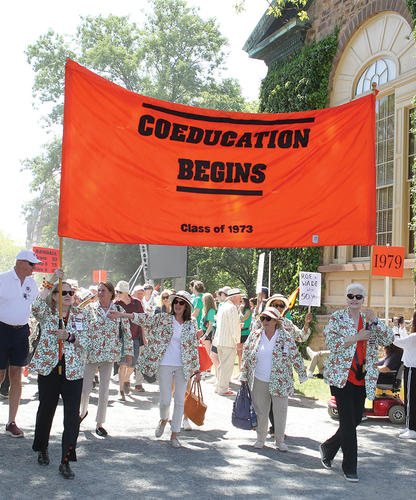
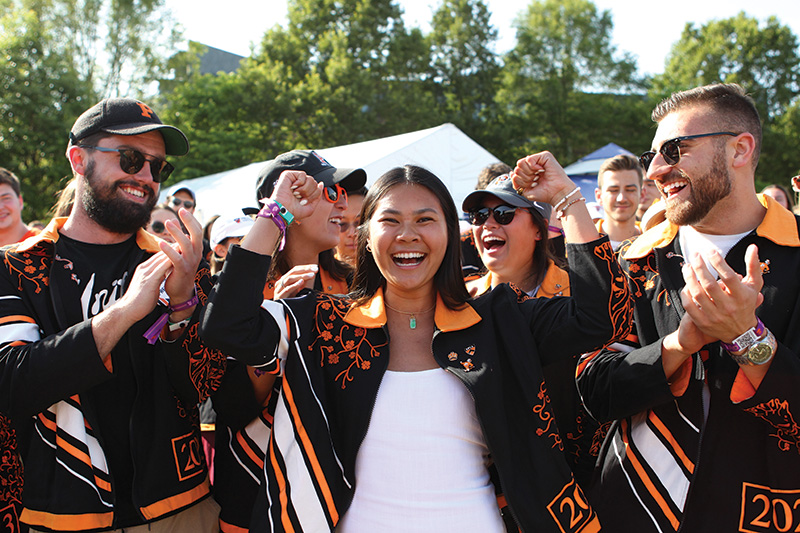
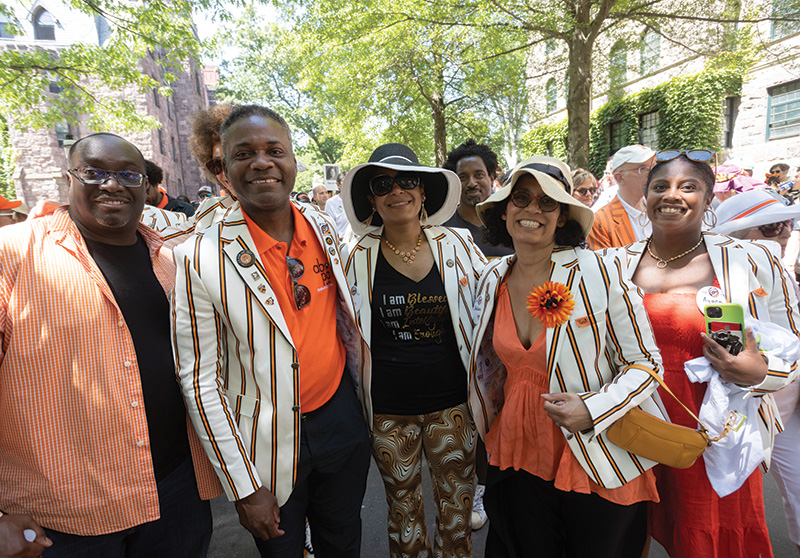

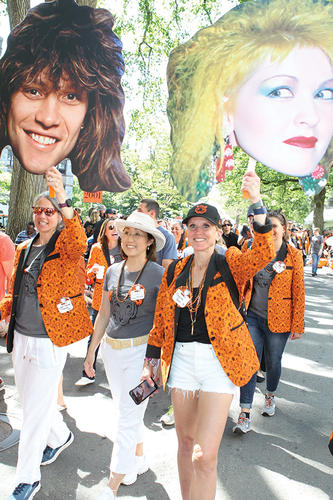


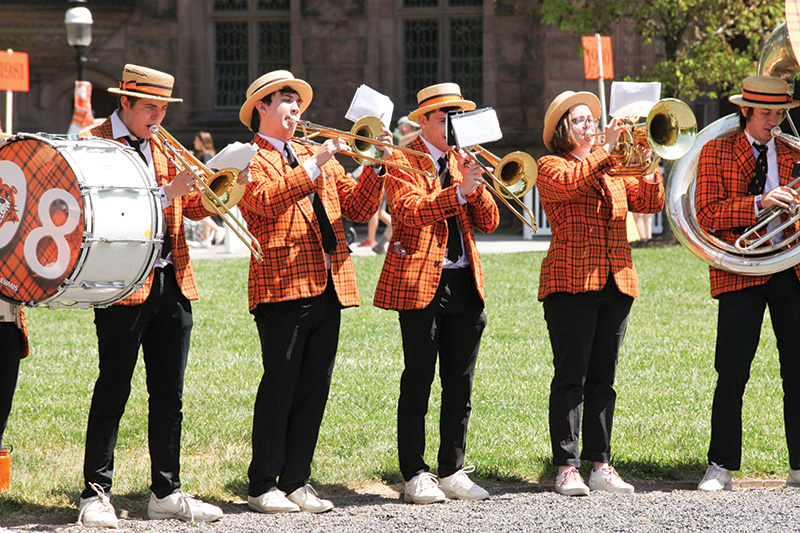

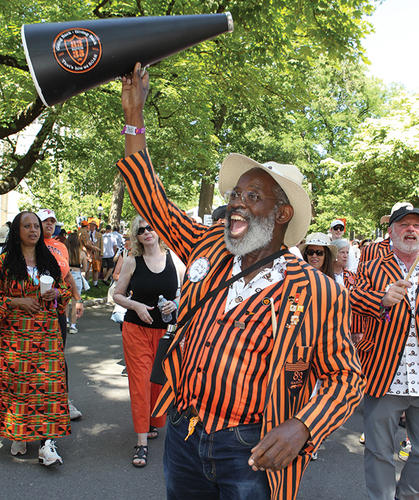
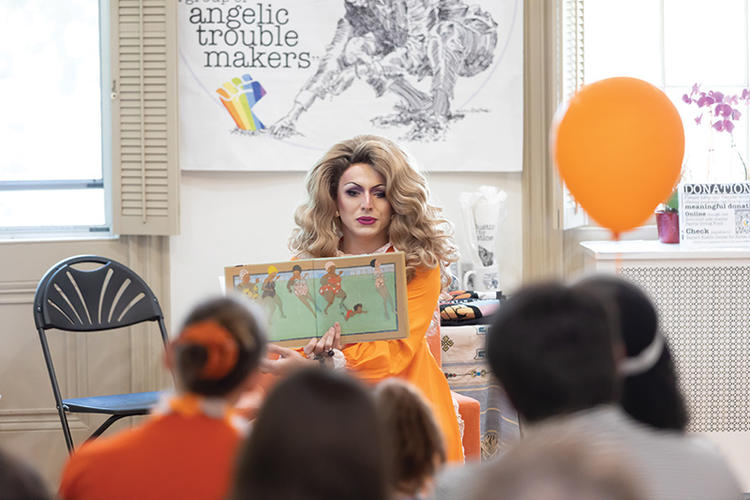
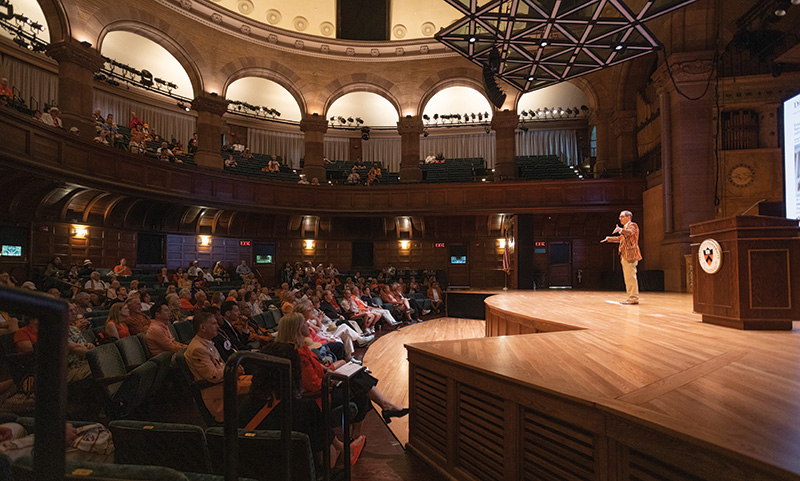
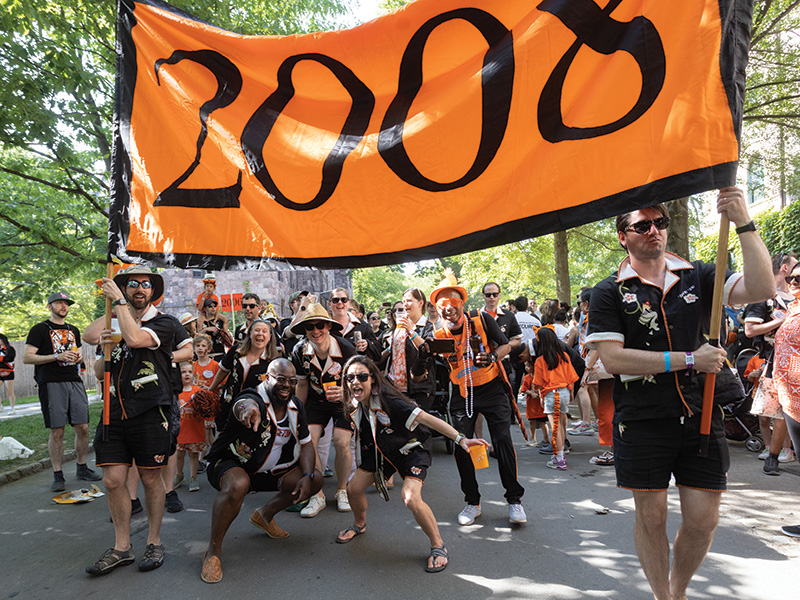

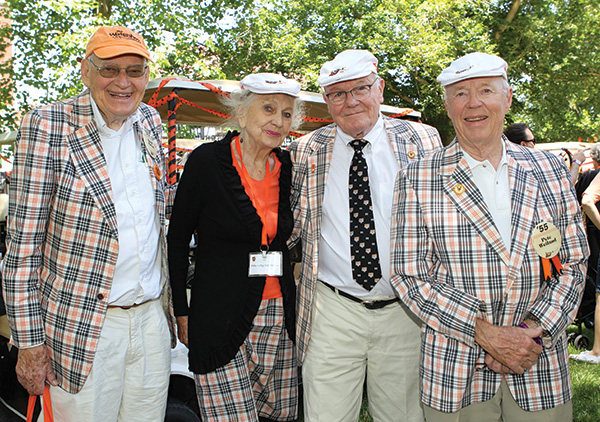
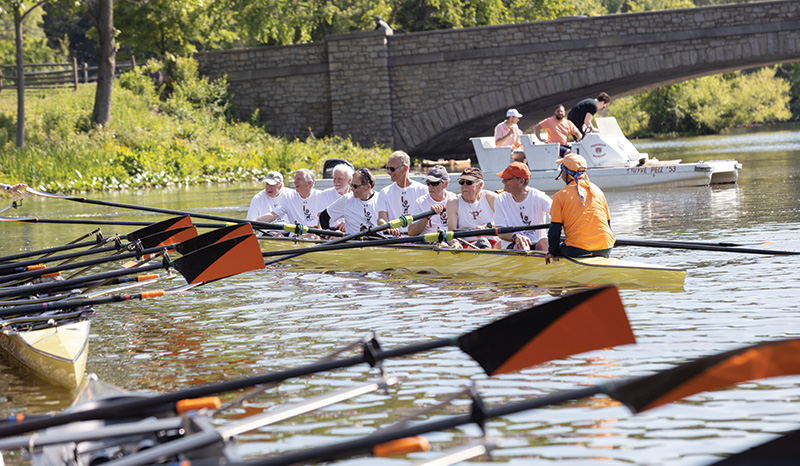
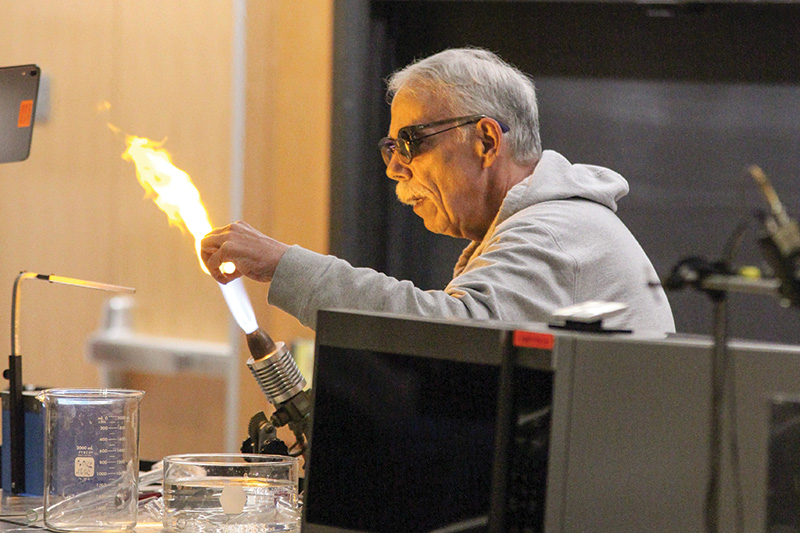





7 Responses
Tom Leyden ’77, Zach Goldstein ’05
2 Years AgoClimate Change Is an Emergency
We are writing in response to the Reunions panel “Why Climate Change is NOT an Emergency,” mentioned in your July/August issue. While we can and should have a spirited debate over what the consequences of climate change could be for life on Earth, the basic fact that it is happening is not up for debate anymore. Giving a microphone to those who deny basic reality turns this topic into a political one and severely hampers our ability to create the social will to meet the challenge.
If the University felt pressured to include a climate debate in the name of free speech, it should have insisted on representation from more credible sources than this and included University-affiliated scientists to represent the prevailing view that, yes, climate change is an emergency.
What the “non-emergency” experts said was peppered with questionable science and absurd propositions: that CO2 release doesn’t have the least impact on climate, that deforestation isn't happening, that sea levels aren’t rising. The panelists cherry-picked facts, making up their own version of reality. No counterpoint was expressed until the Q&A.
This panel was a shameful embarrassment to Princeton, with its mission of being “in the service of humanity.” Incredibly, some panelists are now touting the fact that Princeton gave them a voice — and so disinformation metastasizes, besmirching the name of Princeton and casting doubt on a scientific reality that threatens the future of the planet.
The University needs to do better in curating such panels and avoiding fictitious, dangerous positions. Watch the panel for yourself — https://www.youtube.com/watch?v=wEFAVoaLfug — and you decide.
Alex Zarechnak ’68
2 Years AgoThe Climate Panel Backstory
Tom Leyden ’77 and Zach Goldstein ’05 reasonably suggest that the University “should have included University-affiliated scientists to represent the prevailing view that, yes, climate change is an emergency” (Inbox, October issue). The backstory is that the panel sponsor, the Conservative Princeton Association, invited and encouraged two prominent University-affiliated scientists to present the “prevailing” view. One refused; the other did not respond. (I was the one asking.)
Further criticisms from Leyden and Goldstein are refuted in the recording of the panel at https://youtu.be/L_Kc_r3cdH0. Or you can find why climate change is not an emergency on the website for the CO2 Coalition. Please make your own judgment.
Greg Nash ’68
2 Years AgoClimate Panel at Reunions
I was surprised when reading the letter “Climate at Reunions” (Inbox, October issue) with the claim of several “absurd propositions” made by speakers at the recent Reunions panel “Why Climate Change is NOT an Emergency.” Nothing I heard was “absurd.” For example, nowhere was it claimed that sea levels aren’t rising globally. Ironically, the authors said that “University-affiliated scientists” should be represented, when one of the speakers, William Happer, was not only a student at Princeton (*64), but also Cyrus Fogg Brackett Professor of Physics at Princeton from 2003 until his retirement in 2014.
Unfortunately, climate science is monumentally complex, and what “answers” there are come with huge uncertainties. A good starting point for greater understanding is the recent book Unsettled? (2021), by Steven Koonin (former theoretical physicist at Caltech, later Provost there, and Second Under Secretary for Science in Obama’s energy department with over 200 peer-reviewed papers on scientific computation, climate modeling … I could go on) who says that the core questions related to human input to and influence on the climate remain largely unsettled. In particular, he shows that climate models, which represent the entire basis for predicting future temperatures, vary widely. Furthermore, he says that the uncertainty in model outputs has been increasing even as computational systems become more powerful! Consequently, he says, “in terms of providing actionable information, they’re not much good at all.” As far as the “existential threats” we hear about, he notes that even in the most recent “IPCC report that just came out in August [2021, 6th Assessment], you don’t find the words ‘climate catastrophe,’ ‘existential threat,’ or ‘climate disaster’ in it at all. You find ‘climate crisis’ once in the report, and that refers to how the media have dumbed down the description rather than any scientific finding.” For an in-depth interview with him on the specific question of “climate emergency” see the Hoover Institution’s Uncommon Knowledge podcast.
Professor Koonin is just one of many scientists with similar, indisputable climate and meteorological expertise, having similar viewpoints. Unfortunately, such views rarely get aired, which is precisely why panels like that at the recent Reunions serve an important purpose.
Walter Weber ’81
2 Years AgoDeplatforming Weak Arguments?
I strongly object to the letter from Tom Leyden ’77 and Zach Goldstein ’05 calling for the deplatforming of the reunion speakers who questioned climate change alarmism. I did not attend the panel and am no expert on the science, so my point is not to argue who has the better side of the debate. My issue is with the letter writers’ becoming like Inquisitors, saying, in effect, that they know they are right, and that false ideas need to be expelled from polite discourse.
When I was an undergrad, I attended a forum on abortion at Princeton. One of the speakers defending abortion asserted that the baby “comes together from parts in the sixth month of pregnancy.” So far as I am aware, it did not occur to anyone that this speaker’s appalling ignorance of biology and human development should serve as a grounds for having Princeton censor her for “deny[ing] basic reality,” or to suppress her “absurd proposition” to stop “disinformation” from “metastasiz[ing]” — as Leyden and Goldstein would have it. No, her embarrassing lack of knowledge should have been, if anything, a spur for the program organizers on her side to pick a more well-informed representative in future events.
Just so, here. If the panelists questioning the currently regnant climate change view were not the best representatives of their position, that is a problem for them and their supporters to solve, not Princeton.
Lee Van Valkenburgh *70
2 Years AgoApplying George’s Definition of ‘Woke’
The term “woke” is generally applied to condemn the radical political left. Professor Robert George’s definition of “wokeness” (“An Optimistic Outlook for Viewpoint Diversity,” Reunions coverage in the July/August issue) could be useful, but only if he would agree that it should apply equally to those on the radical right who continue to support Trump and howl “witch hunt” while condemning the investigations into his conduct. What say you, professor?
Robert Jiranek ’52
2 Years AgoHas Reunion Clothing Changed?
At Princeton’s 250th Anniversary Convocation, Toni Morrison’s address suggested to me there was a difference between the place of ideas and the place itself, which is certainly orange and black. Clothing fashion seems focused on place.
My father, Leo Jiranek, was a member of Princeton’s Class of 1922. Dad was the reunion chairman for his 25th class reunion. This was the first on-campus reunion; it was held in Holder Courtyard before Holder became Rockefeller College.
Costumes worn in Holder Court then were more muted than they are in 2023.
What has changed?
Hamilton Osborne Jr. ’65
2 Years AgoBiological Differences in Athletics
The portion of the feature article “A Fantastic Time (Reliving Reunions)” that is entitled “Eisgruber Addresses Wide Range of Questions” reports that President Eisgruber said that he supports the decision of the Ivy League to allow Penn swimmer Lia Thomas to compete as a woman. If Mr. Eisgruber had said that he acquiesced to the decision because he could not alter it, his statement would have been entirely understandable, but by stating that he supports the decision, he suggests that he does not understand the significant differences between biological men and biological women.